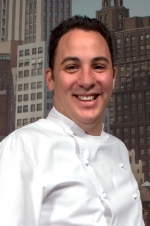Interview with Chef Doug Psaltis of Country at The Carlton Hotel - New York City
Antoinette Bruno: Describe the extent of your F&B operation here. Do you do catering? Banquets? Room service?
Doug Psaltis: There are 250 rooms in the hotel. We have 9 banquet rooms, and one that accommodates 100 people. We do catering off and on-premise.
AB: Which of the F&B outlets requires the most of your energy and which earns the most income?
DP: The café takes a lot of energy to maintain because the hotel requires that it serve breakfast, lunch and dinner. The banquet rooms bring in the most income.
AB: Describe the relationship between the hotel and dining rooms. Are most guests hotel guests?
DP: No, actually, very few diners are hotel guests.
AB: What year did you start your culinary career? What inspired you to pursue cooking?
DP: My grandfather was a waiter and maitre’d in New York and he opened a diner in Queens, so I started I started working there in 1984 when I was 10. I can’t say I did that much serious work there – I was more of an amusement than an employee.
AB: Where have you worked professionally as a chef?
DP: In New York, March, Bouley Bakery, Alain Ducasse at the Essex House, Mix, and Country. I also spent time at Le Louis XV in Paris and The French Laundry in Yountville, CA.
AB: Would you recommend culinary school to aspiring cooks? Do you hire chefs with and without a culinary school background?
DP: I didn’t go, so I can’t recommend it, but I’m sure it’s a fantastic experience for those who do get to go. It’s a great introduction and foundation. But culinary schools of today don’t have a uniform, consistent curriculum, so a lot of people are getting an inconsistent quality of education.
AB: Who are some of your mentors? What have you learned from them?
DP: My grandfather, for his drive and determination, and Alain Ducasse, for his level of excellence.
AB: What question gives you the most insight to a cook when you’re interviewing them for a position in your kitchen? What sort of answer are you looking for?
DP: I want to know why they want the job. I look for simple answers. They should probably have some knowledge about what we’re doing in this kitchen. I also look for someone who knows without question why they want to be a chef.
AB: What advice would you offer young chefs just getting started?
DP: Consistency is important. Your career shouldn’t be a sprint, it should be a marathon.
AB: What ingredient that you like do you feel is underappreciated or underutilized? Why?
DP: Shad roe. Most people are stuck on the old notion that shad is a cheap bait fish, but there are actually a lot of things you can do with it. We marinate the shad roe and use it to finish pasta.
AB: What are your favorite flavor combinations?
DP: Garlic with oil and lemon, black pepper and blue cheese, yogurt and berries.
AB: What’s your most indispensable kitchen tool? Why?
DP: A tiny little hot dog fork. I’ve been fortunate enough to have the same tools for the last 10 years.
AB: What are your favorite cookbooks?
DP: Recipes and Memories by Alain Chapel.
AB: Where do you like to go for culinary travel? Why?
DP: Paris for the bakeries, the shops, and the chocolate.
AB: What languages do you speak?
DP: I struggle through French.
AB: What are your favorite restaurants off-the-beaten-path in your city?
DP: Land on the Upper West Side for their green papaya salad and Katz’s Deli for the pastrami.
AB: What trends do you see emerging in the restaurant industry now?
DP: I hope that restaurants are returning to classics instead of trying to make everything quick, fast, and cheap.
AB: What is your philosophy on food and dining?
DP: A meal should be exciting, but not intimidating – just a gathering with family and friends and good food.
AB: Which person in history would you most like to cook for?
DP: I’d like to cook for and eat with Pete Rose, just for the interesting company.
AB: How are you involved in your local culinary community on a national and global level?
DP: I teach at CCAP once a week. Working with kids at culinary school – bringing them in to my kitchen and watching them grow – is really personally rewarding.
AB: What are some of your favorite food-related charities?
DP: It’s hard to name a favorite because I’ve never actually seen any direct results working with charities. I do work with City Harvest and SOS.
AB: What does success mean for you?
DP: Success comes in the form of being in a kitchen of a restaurant that provides a stable environment and provides me the opportunity to cook for guests who appreciate food. I’d love to have my own restaurant – a bistro with elevated everyday food.
AB: What is your biggest challenge as a chef?
DP: Being inside a hotel, we don’t have complete control over the mechanics of our kitchen. Simple things like plumbing and electric can get challenging.

Chef Doug Psaltis
Country at The Carlton Hotel (Now Closed)90 Madison Ave.
New York, NY 10016
Twitter@dpsalt





